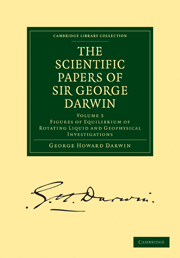 The Scientific Papers of Sir George Darwin
The Scientific Papers of Sir George Darwin Published online by Cambridge University Press: 07 September 2010
In a previous paper I remarked that there might be reason to suppose that the earliest form of a satellite might not be annular. Whether or not the present investigation does actually help us to understand the working of the nebular hypothesis, the idea there alluded to was the existence of a dumb-bell shaped figure of equilibrium, such as is shown in the figures at the end of this paper. These figures were already drawn when a paper by M. Poincaré appeared, in which, amongst other things, a similar conclusion was arrived at. My paper was accordingly kept back in order that an attempt might be made to apply the important principles enounced by him to this mode of treatment of the problem. The results of that attempt are, for reasons explained below, given in the Appendix.
The subject of figures of equilibrium of rotating masses of fluid is here considered from a point of view so wholly different from that of M. Poincaré that, notwithstanding his priority and the greater completeness of his work, it still appears worth while to present this paper.
The method of treatment here employed is simple of conception; but it is unfortunate that, to carry out the idea, a very formidable array of analysis is necessary.
In the last section a summary will be found of the principal conclusions, in which analysis is avoided.
To save this book to your Kindle, first ensure [email protected] is added to your Approved Personal Document E-mail List under your Personal Document Settings on the Manage Your Content and Devices page of your Amazon account. Then enter the ‘name’ part of your Kindle email address below. Find out more about saving to your Kindle.
Note you can select to save to either the @free.kindle.com or @kindle.com variations. ‘@free.kindle.com’ emails are free but can only be saved to your device when it is connected to wi-fi. ‘@kindle.com’ emails can be delivered even when you are not connected to wi-fi, but note that service fees apply.
Find out more about the Kindle Personal Document Service.
To save content items to your account, please confirm that you agree to abide by our usage policies. If this is the first time you use this feature, you will be asked to authorise Cambridge Core to connect with your account. Find out more about saving content to Dropbox.
To save content items to your account, please confirm that you agree to abide by our usage policies. If this is the first time you use this feature, you will be asked to authorise Cambridge Core to connect with your account. Find out more about saving content to Google Drive.